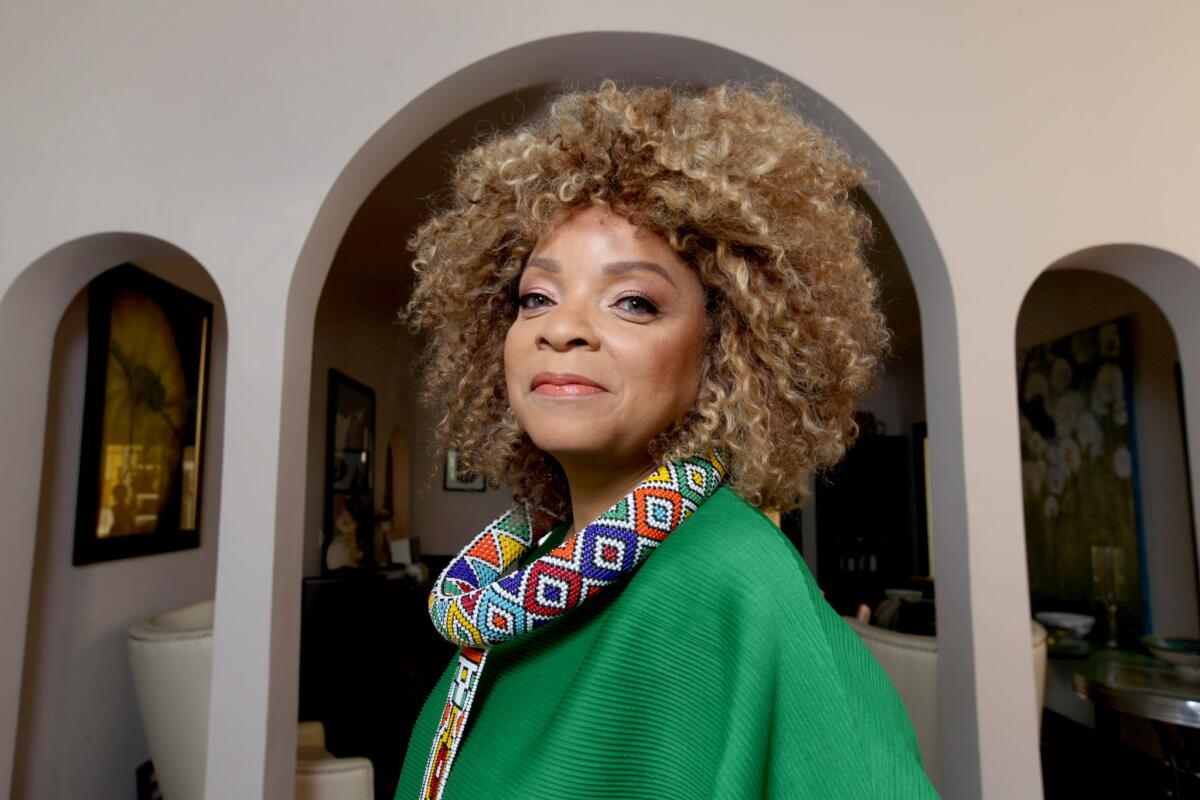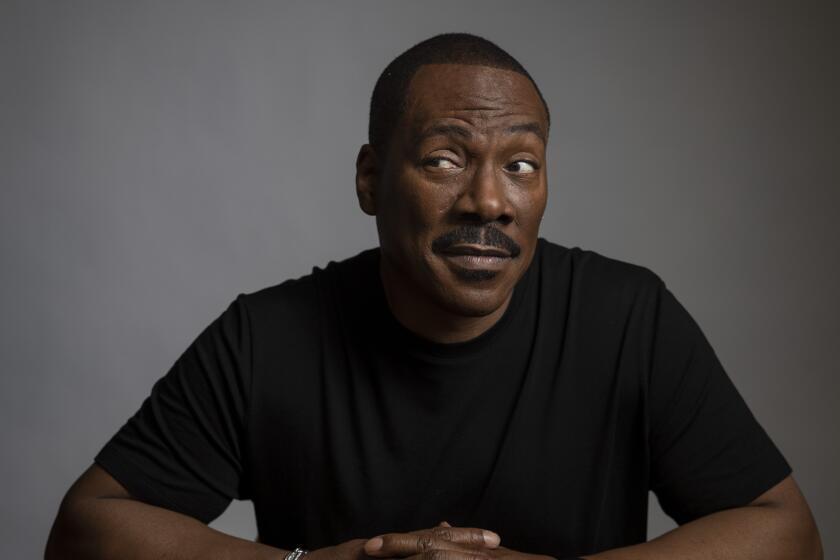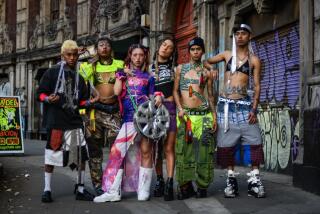Costume designer Ruth E. Carter brings the ‘urban dandy’ to life in ‘Dolemite Is My Name’
Oscar-winning costume designer Ruth E. Carter’s latest film, “Dolemite Is My Name,” is awash in 1970s urban glamour: white marshmallow shoes, homburgs, frilly tuxedo shirts and bulky fur maxi coats — all patterned with the bright, bold colors of the era.
The film is based on comedian Rudy Ray Moore (played in the film by Eddie Murphy) and his true story of delayed comic and film success as a high-octane and dapper stage character Dolemite. Carter and her team created each of the 75 costumes Murphy wore as both characters.
“We made everything for Eddie 100%, including his shoes, and that in itself was a feat,” says Carter, noting that the period-perfect and sometimes kitschy fabrics all came from International Silks & Woolens in Los Angeles. “We bought a truckload from them, literally,” she says.
Despite being filmed all around Los Angeles,“ ‘Dolemite’ was about Rudy Ray Moore’s journey as a comedian and a filmmaker; I never looked at it as an L.A. story,” says Carter. “It’s more of a triumph, feeling-good-about-yourself thing, a story about winning against the odds. It was a fun project.”
Is there a specific term to describe Dolemite’s niche period costumes?
I like to call it “urban dandy.” The 1970s was a breakthrough time not only in fashion and in textiles, but also in many subcultures: blaxploitation, hippie, civil rights, Black Panther. And that black urban ‘70s was the same everywhere, because people across the nation watched the films that were out, and you’ll see it — urban dandy — in magazines, catalogs, in films such as “Shaft” and “Superfly.” Those films gave you a sort of inside scoop on how to look hip and how to be fly. And so everybody wanted it. It was a visually expressive time with clothing and fashion.
Rudy Ray Moore and these men, then, looked to the 19th century dandies for their inspiration: The frilly blouses, hats, canes and coats?
Yes. That’s why I call it the urban dandies. I really have a problem with the term “pimp style”; even Rudy says, “I’m not a pimp. It’s just a character.” When you look at those dandies of the 19th century or even the 17th century — the big hats with feathers on them, the tights and the shoes with bows — why not for the 1970s? It’s not just a blaxploitation trend, it’s a philosophy of dressing.
Eddie Murphy, director Craig Brewer, and the cast and writers of “Dolemite Is My Name” on the legacy of Rudy Ray Moore
How did you keep all the flamboyant clothing from becoming a cartoon or caricature, or even the story focus?
From Day One, my philosophy to my crew was that we were going to look at all the trends of the era, not just one. So it’s not just bell bottoms, platform shoes, big Afros and polyester suits; to me this has become the quintessential ‘70s look. If you threw a party with ‘70s dress, you’re guaranteed five out of six people will have a big Afro, huge sunglasses and platform shoes. I wanted to explore all the trends that came out of the early ‘70s: Embroidery on jeans, the midi and maxi coat, matador pants. If you broaden the trends with more nuance, they won’t appear like caricatures.

You’ve worked with Eddie Murphy now on six films. [Carter recently finished filming “Coming 2 America” with Murphy.] What’s your costume language with him at this point? How involved is he?
Even though there’s a latitude in what I’m doing, I do share with him so he knows what direction I’m going in and he’s not surprised. I do illustrations and present them; I ask him questions along the way. He’s really good with helping you solve dilemmas, like if Dolemite the character is this way, what should Rudy Ray Moore wear? And that’s when he responded: “I think he should wear those leisure suits.”
After keeping a low profile for more than a decade, the comedian is back in the spotlight with Oscar buzz, a return to stand-up, movie sequels and more
He won’t say, “I want a purple suit,” he says, “Remember those leisure suits? Hey, what about this?” He doesn’t claim to have all the answers, but he does have an opinion about what he wants to wear. We’ve just had a good run, where the ideas in both my head and his head have been simpatico.
If you could pick one favorite costume to showcase and explain Dolemite the character, what would it be?
For Eddie, definitely, it’s the pink suit with the carnation. When I see him on that stage in that club, he really steps away from the rest. Eddie told me when his kids visited him on the set: “My kids like it.” I thought, yeah. It’s something new and cool again. I think my crew really got it right as I wanted the atmosphere in the film to feel very normal and natural to the ‘70s so we could really focus on how much bigger than even the ‘70s Dolemite was.
You filmed “Dolemite” in July during that terrible heat wave in Southern California. How did you manage with all the heavy polyester suits and big coats, hats and paraphernalia? Everyone looked so crisp and cool.
Yes, it was one of the hottest summers on record, but people were so excited to get dressed up that it actually kind of made it OK. When I lined up with the actors for a scene and it’s 95 or 100 degrees outside, they’re standing as much in the shade as they can, but people are just so excited to be a part of this film.
I remember one scene when Eddie is walking up the street carrying groceries, saying hi to everyone, and we actually had to put hydro-mist in the air, it was so unbearably hot. I think that was one of the hottest days on record. But you can’t tell on film, with anyone. I don’t even know how we did it. Every day was an adventure.
More to Read
Only good movies
Get the Indie Focus newsletter, Mark Olsen's weekly guide to the world of cinema.
You may occasionally receive promotional content from the Los Angeles Times.











